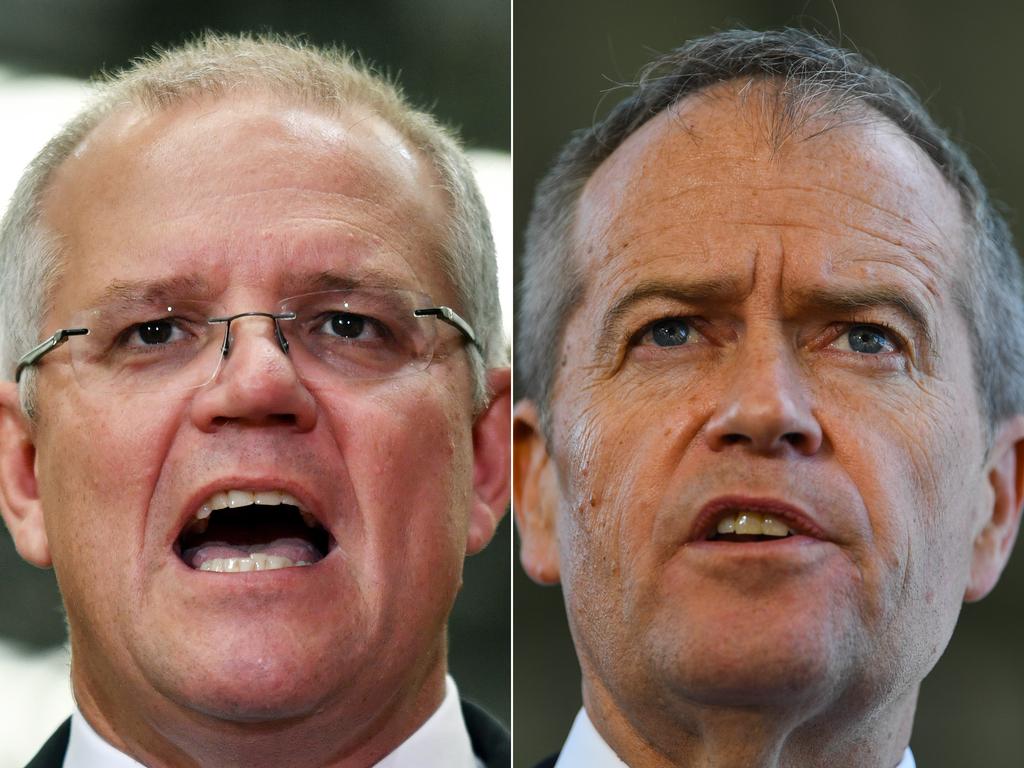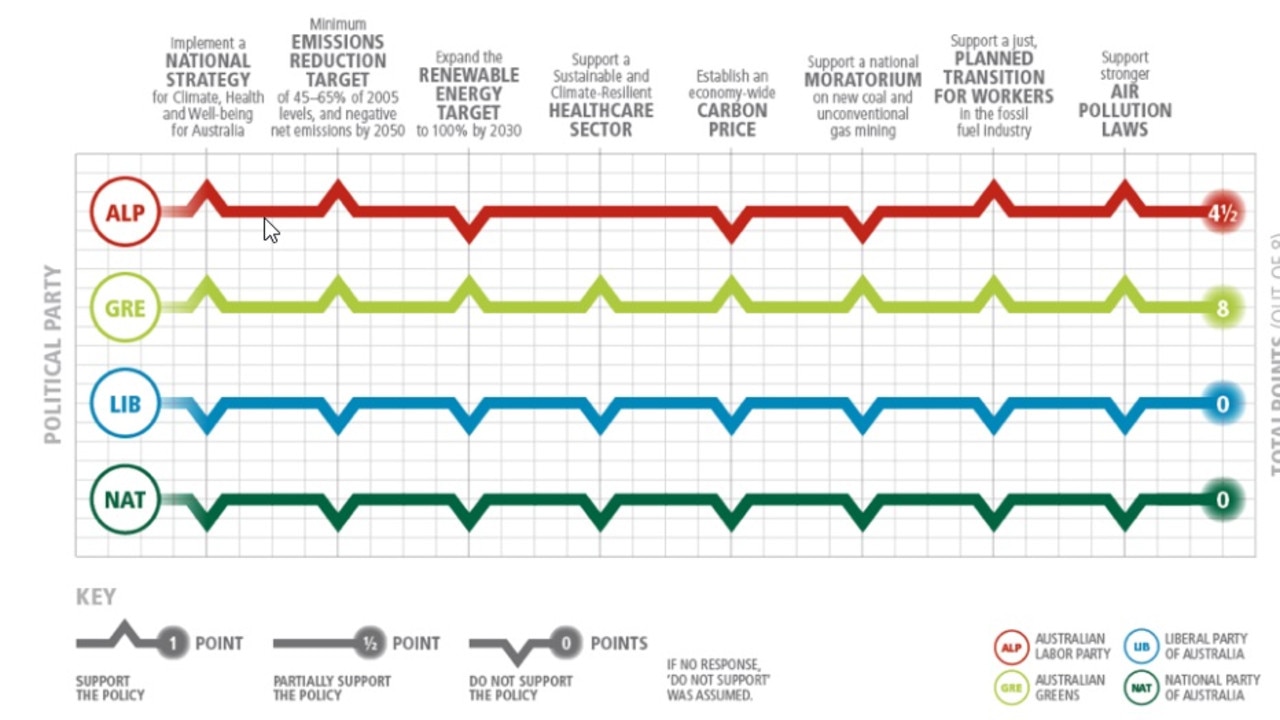The cost of inaction on Australia’s new number one threat
It has been the unlikely key issue that has dominated the election campaign. But less than a week out from the poll, here’s the question we need to ask.
It’s become the biggest issue of the election campaign and could decide who becomes our next prime minister.
While previous campaigns have been dominated by the cost of living and border security, this year has been dubbed the “climate election”.
One question that has dominated the campaign: how much will it cost for Labor to implement its climate change plan?
It’s the point Prime Minister Scott Morrison has tried to pin Labor leader Bill Shorten on.
The Opposition Leader has faced questions for weeks over the cost of his climate change policy, but he’s been unwilling to put a figure on it.
Economic modelling by Brian Fisher suggested Labor’s emissions reduction target of 45 per cent could wipe $264 billion from the economy and kill off 167,000 jobs.
Labor’s climate change spokesman Mark Butler rubbished the “dodgy” modelling, while policy analysts and scientists have praised the party’s ambitious direction.
But while the two leaders have argued over how much action on climate change will cost, experts say we’re overlooking the most important question: What happens if we do nothing?

In piece in the The Guardian, Investor Group on Climate Change policy director Erwin Jackson said the focus on “mythical costs of action” risked “significantly harming” Australia’s prosperity, resulting in another decade of “squandered economic opportunity”.
News.com.au contacted nearly 30 scientists across the country last year to get their views on the contentious issue after it was one of the catalysts for the Liberal Party rolling Malcolm Turnbull in August.
Overwhelmingly they agreed Australia wasn’t doing enough about our “existential threat to civilisation”.
Today their views are just as sharp.
Climate and Health Alliance (CAHA) executive director Fiona Armstrong said even an alarming report from the UN that up to one million species faced extinction was not enough for people to take notice.
“They (humans) might want to be concerned about their own extinction because that’s the direction we’re headed in if we don’t take action on climate change,” she said.
“That will be preceded by prolific suffering.”
READ MORE: Australia’s animal extinction crisis worsening and ‘inevitable’
CAHA comprises more than 50 groups representing more than one million Australians who want action on climate change.
Its scorecard on climate health puts the Greens at the top, the Liberals at the bottom and Labor somewhere in between.

While CAHA’s focus is on the health sector, the impacts of climate change are wide ranging. from wiping billions off the property market to more catastrophic weather events.
‘CLIMATE CHANGE IS A HEALTH EMERGENCY’
With the health sector accounting for 7 per cent of Australia’s emissions — more than the waste and industry processes sectors — CAHA says the health impacts of climate change aren’t being recognised.
Ms Armstrong said policies were “woefully inadequate”, with inaction putting “lives at risk”.
She said an increase in air pollution, exacerbated by heatwaves, would lead to more respiratory distress, heart attacks, emergency call-outs and hospital presentations.
READ MORE: The divisive issue Australia can no longer ignore
“Very rarely is the health sector acknowledged but it’s the largest industry, the largest employer,” she said.
“We can’t afford not to take action on climate change because it’s going to be cheaper if we do. Health and medical groups are extremely alarmed. Climate change is a health emergency.”
Why is government here, if not for the well-being of its people and an environment that sustains us?
— Public Health Association Australia (@_PHAA_) May 8, 2019
Ahead of the leader's debate, we urge @ScottMorrisonMP @billshortenmp make climate health a bipartisan priority.#ausvoteshealth @healthy_climate @terryslevin @SabraLane @ABCTV pic.twitter.com/HIN2h2aTHi
Mr Shorten announced last week a Labor Government would commit $15 million to develop the National Health and Climate Centre at the University of NSW.
The Australasian College for Emergency Medicine was among CAHA members to write an open letter to all political parties and candidates calling for action on the health emergency caused by climate change.
“The health impacts of climate change on vulnerable communities are the cause of deep concerns among health and medical professionals worldwide,” president Dr Simon Judkins said.
“Emergency departments are at the forefront of dealing with the increasing number of disasters such floods, heatwaves and fires, and this is only likely to become a bigger issue in the decades to come.”
Massachusetts Institute of Technology researchers have looked at the savings made from carbon-reduction policies in the United States and found that, in some cases, the costs related to illness can be more than 10 times the cost of policy implementation.
University of Sydney political economy lecturer Dr Gareth Bryant said the debate needed to move beyond the narrow focus on cost to the economy.
“With the right policy support, acting on climate change is also a big opportunity to create quality jobs and improve infrastructure in Australia,” he said.
“The costs of clean energy are quickly coming down while the costs of climate change are rapidly going up.
“One of the problems is costs are framed in a negative way and reduces the capacity for people to understand the benefits of acting on climate change, which are not only avoiding the catastrophic effects but providing opportunity to restore our economy in a more sustainable framework. Clearly the costs of acting are less than not acting.”
Continue the conversation @stephanie_bedo | stephanie.bedo@news.com.au




